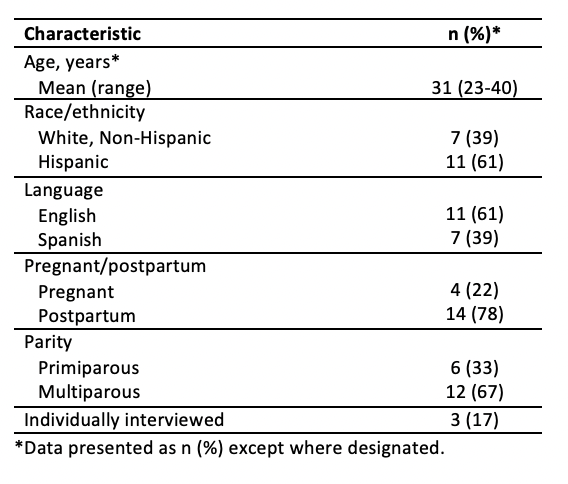Health Equity/Social Determinants of Health
Health Equity/Social Determinants of Health 10
594 - Experiences accessing nutritious foods pre- and postnatally among mothers with low-income
Publication Number: 594.411

Jessie Benson
Medical Student
Texas Tech University Health Sciences Center School of Medicine
Amarillo, Texas, United States
Presenting Author(s)
Background:
Access to nutritious foods is a social determinant of health which contributes to disparities in
mental and physical well-being for mother-infant dyads. Proper nutrition impacts maternal and
infant health outcomes such as mental health, breastfeeding intensity, and cardiometabolic
risk.
Objective:
This study explored the perceptions about and experiences with accessing and consuming
nutritious foods during and after pregnancy among pregnant or postpartum women eligible for
Medicaid.
Design/Methods:
Qualitative, semi-structured interviews were conducted via Zoom from October 2021 to April
2022. The sample included 18 women who were either currently pregnant or up to 12 months
postpartum. Mothers spoke English (n=11) or Spanish (n=7) [Table 1]. This study took place in a
mid-sized city in a rural area in the Texas Panhandle. Interviews were audio-recorded,
transcribed, and verified. Spanish transcripts were translated into English for analysis. Two or
more researchers coded each interview using thematic analysis with ATLAS.ti software, then
discussed and agreed on coding and analysis.
Results:
Four themes emerged that indicated circumstances during pregnancy and the
postpartum period add to the difficulty of obtaining nutritious foods [Figure 1, Table 2]. 1-
Social factors influence nutrition: Women without strong support systems to provide
them with prepared meals or nutritious foods were dissatisfied with their ability to eat
healthfully. 2- Nutrition during and after pregnancy could be stressful: Women expressed regret
and anxiety about how they were eating during and after pregnancy. Stress was bidirectionally
related to unhealthy food choices, with food sometimes used as a coping mechanism. 3-
Prioritization of baby and other children: Demands of pregnancy and newborn care
limited the ability and time to prepare healthy meals. 4- Nutrition guidance from healthcare
professionals was inadequate: Most participants were dissatisfied with the nutrition guidance they received, and desired more professional guidance.
Conclusion(s):
Although mothers may recognize the importance of nutritious eating during and after
pregnancy, many low-income women experience challenges specific to this life stage: increased
stress, prioritization of infant/other children, lack of social support, and limited professional
guidance. We recommend routine nutritional counseling during perinatal visits aimed at
connecting mothers with governmental resources (e.g., WIC, SNAP) and social support (e.g.,
partner, family members, community organizations) that support their ability to consume
nutritious foods during this critical life phase.
.png)
.png)
